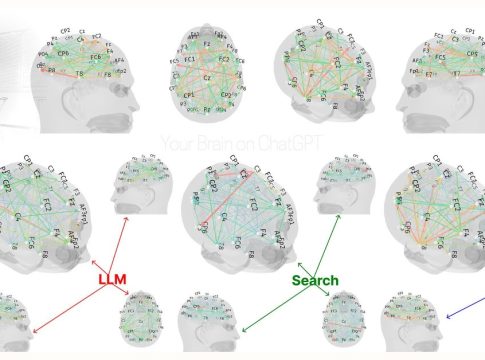ChatGPT and Its Impact on Critical Thinking: New MIT Study Raises Alarms
A recent study conducted by researchers at the MIT Media Lab has stirred controversy regarding the impact of AI, specifically OpenAI’s ChatGPT, on our critical thinking abilities. As reliance on generative AI tools becomes more pervasive, the findings highlight potential drawbacks, particularly for younger users.
Study Overview: A Deep Dive into Brain Engagement
The research involved 54 participants aged 18 to 39 from the Boston area, divided into three groups. Each group was tasked with writing essays based on SAT prompts under different conditions: one group utilized ChatGPT, a second searched for information via Google, while the third produced essays without any AI assistance. Researchers employed EEG technology to monitor brain activity across 32 regions, pinpointing how different tools influenced cognitive engagement.
Key Findings: ChatGPT Users Lag Behind
The results revealed that users of ChatGPT exhibited the least brain engagement compared to their peers. Not only did they perform poorly in terms of neural and linguistic metrics, but by the end of the study, many participants had resorted to a lackluster approach reliant on copy-and-paste methods. As the essays progressed, this group demonstrated decreasing creativity and originality, producing work described by evaluators as "soulless."
Conversely, those who wrote without AI showed heightened brain connectivity, particularly in areas related to creativity and memory. This group not only engaged more deeply with their writing but also expressed greater satisfaction with their essays. In stark contrast, the Google Search group also displayed strong cognitive engagement, suggesting that not all online research tools diminish critical thinking.
The Broader Implications: A Call for Caution
The primary author, Nataliya Kosmyna, expressed concern about the implications of these findings, particularly for educational policies that might incorporate AI tools at early developmental stages. With the rapid integration of generative AI into classrooms, Kosmyna warns that over-reliance on such technology could stifle the critical thinking skills essential for young minds.
“Education on how we use these tools is critical,” she says, urging policymakers to consider the long-term effects on brain development. The cautionary tone of the study resonates with earlier research indicating that the more time one interacts with AI, the more isolated they may feel.
A Complex Relationship with Technology
Interestingly, the study has prompted policymakers and educators to reevaluate how AI can be integrated effectively into learning environments. While it’s tempting to adopt these technologies for their efficiency, the results imply a trade-off with deep learning and cognitive engagement.
In the broader context of AI evolution, this study adds a crucial layer to the ongoing debate surrounding the balance between convenience and understanding. As more solutions emerge, from coding to creative writing, the challenge remains: How can we harness the power of AI without compromising human intellect?
Conclusion: Moving Forward Thoughtfully
As the landscape of education and technology evolves, the dialogue around AI’s role in learning must remain dynamic and informed. Future research from Kosmyna and her team into software programming tools suggests that the findings may extend beyond academic writing, hinting at even more significant implications for a workforce increasingly reliant on AI.
With calls for legislative guidance and careful integration into curricula, the conversation has only begun. As we move forward, it’s essential to strike a balance that fosters innovation while ensuring the cultivation of critical thinking skills necessary for future generations.

Writes about personal finance, side hustles, gadgets, and tech innovation.
Bio: Priya specializes in making complex financial and tech topics easy to digest, with experience in fintech and consumer reviews.

